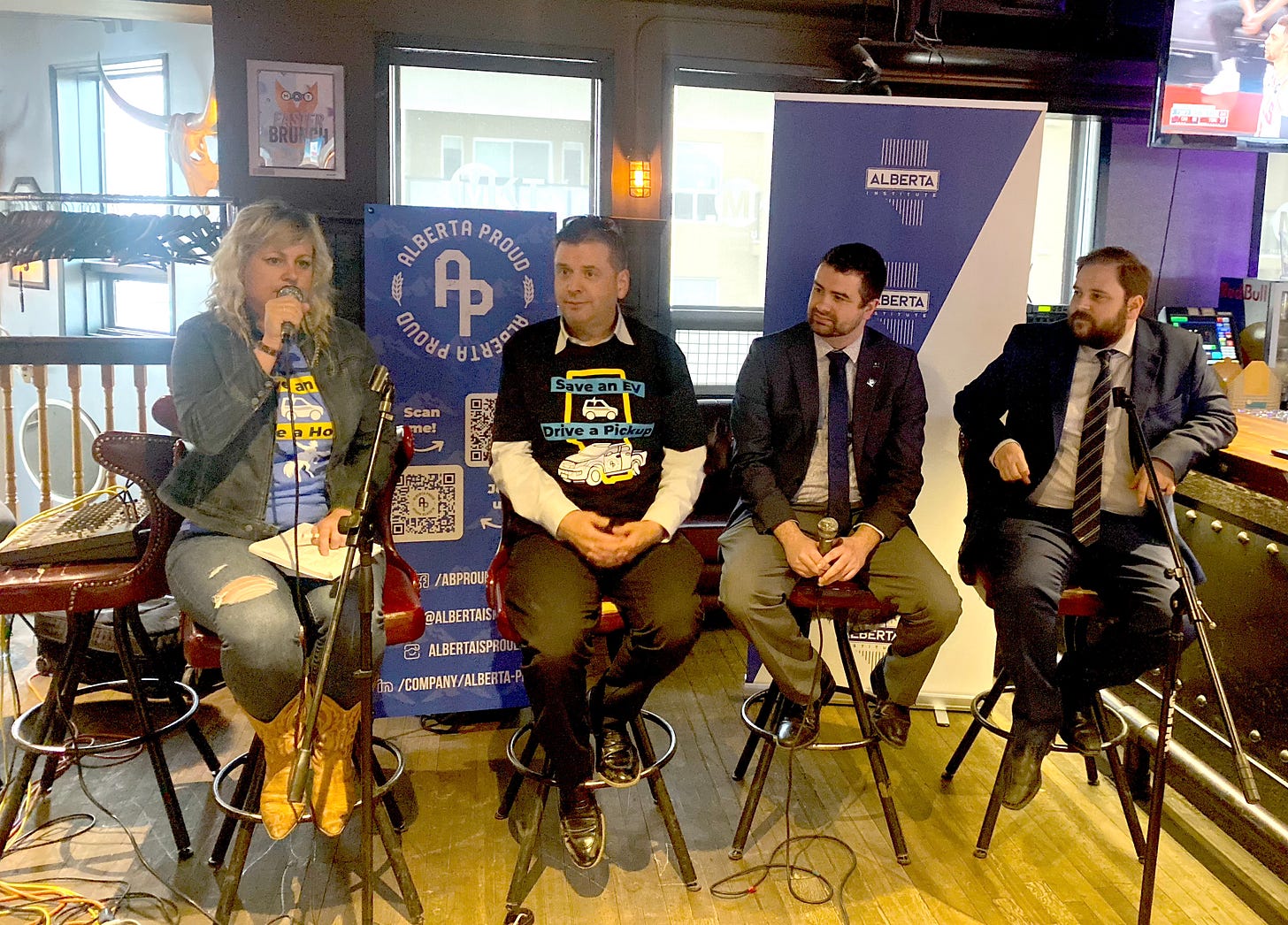Can't Stop Alberta ... From What Exactly?
My evening with Alberta Proud.

Alberta Proud’s “Can’t Stop Alberta” tour rolled through Edmonton on April 12 and I figured I’d give the event a whirl.
After all, these are the forces pushing Premier Danielle Smith to make good on her promises to chip away as much power from the federal government as possible and pursue large-scale privatization under the framework of “choice.”
I’m fascinated by this right-wing movement building around Smith that’s harnessing the populist energy former premier Jason Kenney summoned but couldn’t satiate.
At the front table in the upstairs of the MKT Beer Market, where the event was held, sat a laminated copy of the Alberta Proud pledge, alongside pencils and paper copies for attendees to sign.
The pledge reads, in part:
I will vote for the premier who defends our energy, defends our sovereignty, and defends our provincial borders over meddling from the federal government, or other governments who threaten our sovereignty.
I will vote to keep Alberta jobs, Alberta taxes, Alberta opportunity, right here in Alberta, for us and our children.
I will vote for choice in healthcare, education, jobs, and markets.
I will vote in the interests of regular hardworking Alberta men and women on the front lines of our industries. [Emphases mine]
I emphasize ‘other governments,’ because that could have various meanings.
Is this a reference to First Nation governments? With all the hullabaloo over delegates to the Assembly of First Nations asking the federal government to rescind the 1930 Natural Resources Transfer Act, this would appear to be an accurate interpretation.
It could also be a dogwhistle to those who believe that any day now the United Nations is going to impose a Global Government with Prime Minister Justin Trudeau’s blessing.
Or it might be pesky municipal governments. There was plenty of complaining about those in the event’s second half, although it’s hard to see how municipalities could threaten the sovereignty of the province they’re located in.
Either way, the message is clear — Alberta’s provincial government is paramount.
Alberta Proud bills itself as a “nonprofit grassroots advocacy group,” but this definition of ‘grassroots’ proves quite flexible. Third Party Advertisers, which Alberta Proud is, are allowed to receive corporate donations, unlike candidates. And boy do they ever.
Of the $165,450.44 it raised in the lead up to the 2019 provincial election, $86,000 came from businesses linked to two people — Calgary’s Naim Ali and Edmonton’s John Mather.
But they also collect small donations. At Wednesday’s confab, you could buy a “Save an EV, Drive a Pickup,” or for the more environmentally conscious, “Save an EV, Rise a Horse,” t-shirt. It was $20 for one and $30 for two.
Alberta Proud president Lindsay Wilson, a former Cochrane Eagle reporter-turned-staffer for former Calgary city councillor and failed mayoral candidate Jeromy Farkas, hosted the event, which consisted of two panels.
The first, oriented around “standing up for Alberta,” concerned the usual buffet of Alberta grievances — sovereignty, energy development and finances.
Speaking on that panel were Robbie Picard of Oil Sands Strong, Josh Andrus of Project Confederation, and Peter McCaffrey of the Alberta Institute.
For what it’s worth, I found McCaffrey to be the most lucid of the bunch and Picard to be the craziest, with Andrus falling somewhere in between.
Wilson’s first question was what the biggest issue facing Alberta is.
McCaffrey said there’s a major oil and gas boom on the horizon, one which will “create a generational opportunity” by making the “booms of the early-2010s look small by comparison.” The issue, he said, is what to do with all that money once it arrives.
He didn’t indicate the cause of this impending boom, or what we should do with this money.
Andrus cited affordability as the defining issue. Fair enough.
He said the three components of affordability are monetary policy, fiscal policy and energy policy — with heavy emphasis on the latter.
The solution is “to produce copious amounts of affordable energy.” While the feds “think they did us a favor by buying” the $7-billion Trans Mountain pipeline expansion from Kinder Morgan, that price has since increased to $30.9 billion.
I’m unsure what his point is, but if it’s that the feds should have let Kinder Morgan pull the plug on the pipeline, I couldn’t agree more.
Picard claimed “Alberta has the worst case of Stockholm Syndrome in the world.”
"We're always good. We're never great. And we're never great because we were in an abusive relationship with Ottawa. They take our money, we pay alimony to them every single month reluctantly, and they don't help us become great,” he said, exuding major divorced dad energy.
Picard cited Russia and Saudi Arabia as examples of greatness to emulate in terms of energy policy.
The two major barriers to the greatness of Russia and Saudi Arabia is the fact that elections are decided in Ontario and Quebec (where more than half of the country resides).
“If the world was run that way, China and India would make every single decision in the world based on population, so we have a problem there,” Picard said inexplicably.
The other issue is the “facade” that oil and gas is on its way out. “Our economy is good for the next couple of years, but I'm very worried about our collective consciousness, our self esteem and our future,” he said.
In response to a question about the federal government’s impending “just transition” legislation, Andrus said he’s concerned about the brain drain that will come from Alberta losing so many oil and gas jobs.
I was concerned about the brain drain coming out of my head as I sat through this panel.
Andrus recalled the days of the 2014 oil crash, which he said paled in comparison with what was to come.
“You could see in people's lives, everybody knew somebody that had lost a job or was losing their home or was going through a divorce,” he said.
Andrus’s fear is rooted in the faulty assumption that oil and gas workers have no use outside of the oil and gas industry, as if there are no ways to ease the inevitable transition away from fossil fuels towards a clean economy.
Even with major corporate tax cuts and record high oil prices, the data shows the industry is still laying off workers, as I’ve highlighted in this space before.
Those jobs that are being dangled in front of laid off energy workers’ heads aren’t coming back, not because of federal legislation that has yet to be brought forward, but because oil and gas companies are investing their profits elsewhere — namely in automation and executive compensation.
“Green energy doesn’t exist. All forms of energy have a price and a cost,” Picard said in an amusing non-sequitur.
The just transition was cooked up by Canadian author and journalist Naomi Klein, who worked with U.S. Congresswoman Alexandra Ocasio-Cortez to bring the Green New Deal to Canada, Picard claimed, apparently unaware that the Green New Deal hasn’t been implemented in any capacity.
“They've deliberately gone into all levels of government, particularly in the municipal level of government to try and use that wording to push their agenda,” he said.
Really? Naomi Klein and AOC did that?
McCaffrey said a just transition is the “perfect encapsulation” of the federal government’s ideology, which, in true conservative fashion, he thinks is way cooler than it is.
“Top-down socialist government planning economies don’t work, free markets work,” he said. “We will transition to new technologies when the new technologies make sense and they're affordable, not when the government forces us to.”
If we take the climate crisis seriously, however, then we don’t have the luxury of transitioning to clean energy on the oil and gas industry’s timeline.
The first audience question was, “Separation — if not now, when?” The three panelists were clearly conflicted, contrasting with the event’s billing of an unstoppable Alberta.
McCaffrey said he wants to find “a line somewhere in the middle” between the extremes of separating from Canada and staying under any circumstances, invoking Barry Cooper, co-author of the “Free Alberta Strategy” that formed the basis of the Alberta Sovereignty within a United Canada Act.
His idea of this middle ground is abolishing equalization, where taxes collected from wealthy Canadians across the country are distributed to the less wealthy provinces, which is “basically just socialism for provinces.”
Andrus says he believes there is an appetite across Canada to take Alberta’s grievances seriously. “Nobody wants to see anger rise like it has,” he said.
If the rest of the country won’t take Alberta separatist demands seriously, then it’s a different story. “At that point, it’s inevitable,” Andrus said. “Alberta will become powerful enough and able to stand on our two legs.”
Picard said he recently toured across Canada and spoke to people who were sympathetic to Alberta's ambitions.
One of them was Jordan Peterson, whom he met for dinner. “I don't think we're really a country,” he recalled telling Peterson. “We’re the second largest country landmass, we are so different from each region, and we don't support each other, and our patriotism ebbs and flows.”
I wanted to know more about this dinner with Peterson, so after the panel I asked Picard for more details.
“It was one of my favourite dinners of my life,” Picard said, adding that Peterson agreed with him that Canada lacks a strong, unified national identity.
What did they have for dinner? Steak, of course. Picard said he’s been trying out Peterson’s infamous all-beef diet, but cheats by eating vegetables.
The second panel was about crime, disorder and public safety, featuring the wildly uncharismatic former Edmonton Sun reporter, city councillor and MP Kerry Diotte, the Western Standard’s prolific exploiter of the unhoused Arthur Green and Common Sense Edmonton’s Will Vishloff.
This part’s for paid subscribers only. If it may entice you to cough up $5 a month, I’ll note that Green sneered at me from the stage.




